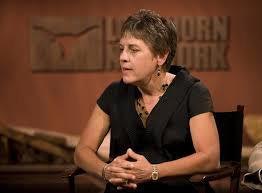 Christine Plonsky, University of Texas women’s athletic director, said the school regards athletes as students first, even for those in the high-profile football and basketball programs that bring in tens of millions of dollars a year.
Christine Plonsky, University of Texas women’s athletic director, said the school regards athletes as students first, even for those in the high-profile football and basketball programs that bring in tens of millions of dollars a year.
Christine Plonsky said she couldn’t imagine a scenario where some of her university’s athletes were able to make money from their appearances in televised games, at the same time hundreds of athletes in other sports only get tuition and room and board for their efforts.
“I don’t believe that our university would approve of an activity where a segment of our student-athlete population was professionalized,” Plonsky said. “I know we strongly believe our student-athletes should not be professionalized in any way.”
Taking the stand after six days of witnesses called by plaintiffs in the antitrust trial brought by former UCLA basketball star Ed O’Bannon and others, Plonsky said Texas regards athletes as students first, even for those in the high-profile football and basketball programs that bring in tens of millions of dollars a year.
“They are students and they compete on teams. Students do a variety of things on campuses like UT and others,” she said, adding later: “The progress toward a degree is emphasized as much as excellence on the playing field.”
Plonsky’s testimony came after a Drexel University professor and author of a book on the influence of money on college sports gave the opposite viewpoint on the stand, saying the NCAA’s contention that athletes in big money sports are students first is self-serving and designed only to perpetuate a myth of amateurism.
“The NCAA makes the assertion there can be this large college sport enterprise which can be run professionally and engender commercial interest and that can be professional, but the participating cannot,” Ellen Staurowsky said. “That hinges on whether athletes are students first or second. The emphasis is really on their role as an athlete, secondarily the student role.”




















